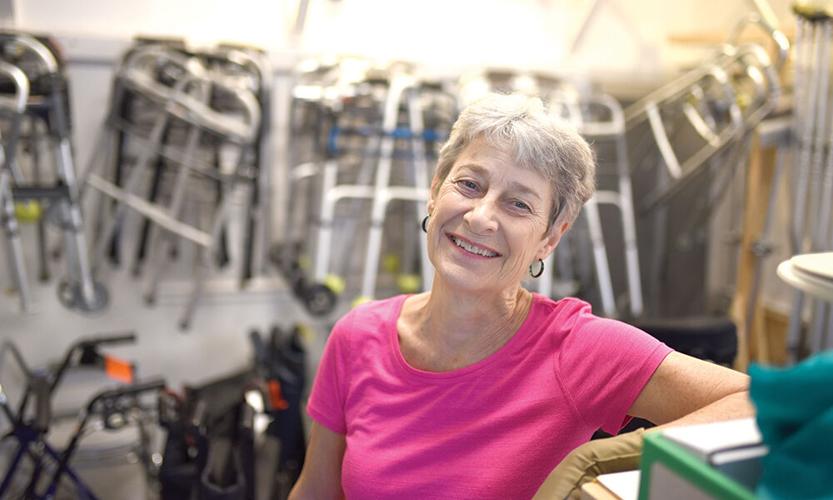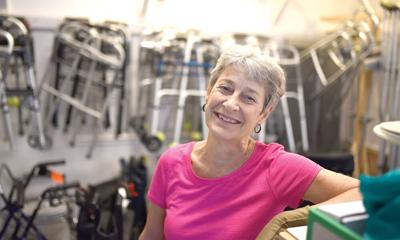Comfort and Care Support: Opening Doors to Care
For those with a terminal or chronic illness, life can get pretty scary and overwhelming. The same is true for the family members of the individual. Comfort and Care Support is here for families in our community and ready to help. Their goal is to lighten the load for families, and that’s exactly what they do, all with a staff of four and their team of volunteers.
Warrenton Lifestyle sat down with Lauren Krastins, Executive Director of Comfort and Care Support, to look behind the scenes at one of the largest non medical hospices in Virginia which also maintains a loan closet of durable medical equipment that is available, free of charge, to anyone in the community who needs it.
As a non medical hospice, what services do you provide?
We provide traditional hospice services, the only difference is that we don’t give medications. Whether patients are in their own home or in a facility, we provide care and companionship. Sometimes just sitting there with them is beneficial, sometimes we read to the patients or listen to music with them. Reading poetry has a calming effect. And when we are there, that gives the caregivers time for their own needs, their own appointments, grocery shopping, that sort of thing. And of course, we provide bereavement support. When someone is passing or has passed, our team is there for them as well. Our feeling is that we want to help the families as well as the patients.
I could use about 100 volunteers because then we could cover the more rural areas. Every community is like a mosaic, and each family is a piece of that mosaic — they have their own culture and habits and expectations. Sometimes they feel like they don’t want to bother anyone, but it’s not a bother. We have to understand what each family’s personal culture requires and try to support them in whatever way they need. Each family needs something different. But it’s rewarding because you get to meet a whole diverse group of people. They are very interesting, and they are very kind.
Isn’t hospice only for terminal patients?
You don’t need to be terminal to receive hospice help. We take care of more than people who need end of life tender care. We are also here for people with chronic diseases like MS or ALS or Parkinsons. The only condition to receive services is that you have to be facing a long term health challenge. We are here to support patients and families who are facing a great deal of stress that could continue for a long period of time.
Is there a fee for your services?
There is no charge for our services at all.
You are based in Warrenton. What areas do you service?
We service Fauquier, of course, but also Haymarket, Gainesville, Rappahannock, northern Culpeper. We are starting to get calls from further afield also.
Tell me about your Loan Closet.
Our loan closet provides durable medical equipment to people who need it for as long as they need it at no charge. We have things like crutches, walkers, and wheelchairs, but also larger equipment like hospital beds and lifts. Anyone can just walk in and get whatever they need. If we don’t have it, we have a waiting list, and we’ll notify them as soon as the item becomes available. We also offer other supplies to distribute, like incontinence items, which are fairly expensive. We have small toiletries, gadgets to help you put your socks on or reach things, really all types of things.
Our volunteers and staff see people that are stressed to the absolute maximum, and they respond to it with the absolute best they have in themselves.
Do most hospices maintain a loan closet?
No that’s not typical of most hospices. We are probably the second largest non-medical hospice in the Commonwealth, and we are the largest one doing durable medical equipment loans.
Where do you get all the equipment and supplies?
It’s all donations, from different sources, both big and small. Frequently when someone passes away their family donates the equipment, and we are absolutely delighted to receive it. It keeps the circle going. Then there are the people who come in and drop $10 in our jar. We also have occasional fundraisers.
Medical hospices are reimbursed for their services, so their budgets are normally somewhere into the millions of dollars. Our budget is substantially lower because we are a non profit and operate completely on donations. If the cupboards get bare I will write a grant to see if we can get some money to make those purchases. The PATH Foundation and the Northern Piedmont Community Foundation are very good to us, and we are also looking for corporate sponsors.

Our volunteers and staff see people that are stressed to the absolute maximum, and they respond to it with the absolute best they have in themselves. And they grow from it, and it adds to our caring community. Inasmuch as the subject we deal with is sad, you’ll always notice laughter in here. People come in here, they get hugs. We try to genuinely be as warm and giving and outgoing as we can be, whether it’s to veterans or anyone else in the community who needs a chance to take a deep breath and get a hug. Hugs are free too.
How busy are you?
I’m so glad you asked that. We are constantly getting busier and busier. In 2016 we had 1,418 calls for equipment; so far this year we’ve had 2,450. We get about 40 calls a day for our services. We’ve served 24 patients and their families so far this year, with a staff of 35 volunteers.
Do you ever feel like you don’t have as many people as you need to help all the people you’d like to help?
All the time! We are always looking to grow and searching for more volunteers. Even if someone only has an hour a month, maybe to sit down to read to somebody who can’t see anymore, it makes a difference. Every little bit helps.
In your dreams, how many volunteers would you like to have?
Oh, I’d love to have a hundred, and we’d still have to sometimes turn people away. We could always use more because Fauquier County is growing year after year by 14-16 percent, and 20 percent of those people are over 50.
How do you find volunteers?
We try to get the word out, and welcome all who express an interest. We have a new program too. We are looking to work more closely with some of the schools to reach teenagers who need volunteer hours and train them to work with patients.
Is there interest in that among the teenagers?
Believe it or not, yes. I think it’s outstanding. We have one young gentleman now who’s already been out with patients and doing very well. He’s 17. He wants to be a doctor, and this is a great start for him.
Interested in volunteering?
For more information on volunteering, visit hospicesupport.org/how-to-volunteer or call 540-347-5922. Volunteers must pass a background check, and the training program consists of eight sessions over two days at the office on Fifth Street in Warrenton. Comfort and Care Support is collaborating with other organizations to improve and enhance their training. Once a volunteer is through the training process, they are assigned to visit patients.
A volunteer perspective
Gary Carroll, a volunteer at Comfort and Care Support, feels that the support they offer is almost more important for the caregivers than the patient. “It’s so important to relieve the caregivers, because people sort of forget about them. Caring for a loved one with an illness — it drains them, I can see it in their eyes when I arrive. While I stay with the patient, they can go out and run errands, or have a cup of coffee with a friend. And they always look so refreshed when they get back.”
The care and attention the volunteers give to the patients is also important. Gary continued, “Sometimes we read to the patients, but sometimes listening is the best therapy — knowing when to be quiet. Everyone, especially older people and veterans, has a story to tell, and sometimes it’s a story that their family has heard over and over. It gives them great pleasure to have a new audience. I get a lot out of the experience.”
He said, “The training at Comfort and Care Support is excellent. We receive training from Physical Therapists that teach us things like how to help patients move around, get up to go to the bathroom, and how to pick them up when they’ve fallen without injuring yourself. We receive training from a Chaplain, who taught us to respect and support patients’ religious beliefs — or lack thereof — without imposing our own beliefs on them. We even had training from a military source who taught us about special concerns when helping veterans, especially those who have been in combat.”




(1) comment
Thanks for this article. There are many sources of funding available nowadays, but a difficult economy is the most crucial factor that may and should always come first for any successful firm. Only by using this strategy can you be successful in business. I decided to take a loan when my business started having financial issues because all of my money was at that point invested in stocks. After carefully weighing the terms of loans from various lenders, I chose to borrow https://paydaysay.com/loan-sites-like-cashnetusa/ because, in my opinion, they have the best terms. I highly recommend it!
Welcome to the discussion.
Log In
Keep it Clean. Please avoid obscene, vulgar, lewd, racist or sexually-oriented language.
PLEASE TURN OFF YOUR CAPS LOCK.
Don't Threaten. Threats of harming another person will not be tolerated.
Be Truthful. Don't knowingly lie about anyone or anything.
Be Nice. No racism, sexism or any sort of -ism that is degrading to another person.
Be Proactive. Use the 'Report' link on each comment to let us know of abusive posts.
Share with Us. We'd love to hear eyewitness accounts, the history behind an article.